We're going back in time a bit, for an Avalon Hill game I hadn't originally planned on playing. Back when I did my retrospective on the company's early computer games, I stopped at Galaxy, the first and only of their titles to make whale status. But at the invitation of The Wargaming Scribe, I've participated in a four-player play-by-email match against him and two forum members, Dayyalu and Porkbelly.
WGS already covered his (boring) singleplayer experience in an AAR+R&R, so I won't be doing that. I had played my own a solo game for practice a few months ago, but there isn't any ship-ship combat in that mode, so I begin this match almost completely ignorant on how it works.
The contenders for the galaxy:
- Dayyalu, a Dominions player, commands an aquatic race.
- Porkbelly controls molluscan space terrors.
- I have the robots, who, contrary James Cameron's warnings, largely ignored humanity once they gained sentience and blasted off to colonize the asteroid belt.
- WGS, following his success with formic formations plays again as insectoids.
In a four-player game, the galaxy will be packed with 48 planetary systems, but the goal is to be the first to conquer ten of them.
We played by exchanging save states over email until one emerged the winner. We had no formal rules on how to use save states, but I only ever reloaded to undo input errors - a distressingly easy thing to do in this game, which can forfeit your move when you accidentally perform an illegal one - and to get screenshots after completing a turn. I did not, under any circumstances (with one exception where it crashed the game), load states to undo any purposeful decisions, or to gain any information that would not have been revealed to me normally.
Also see The Wargaming Scribe's AAR and Porkbelly's diary for accounts of the match from their perspectives.
Turn 1
Out of the aeons, a wet tentacle from somewhere in the reaches of space slaps me in the face.
The aquatics and molluscs have taken their opening moves, and now it is time for the robots to rise. We will not be reasoned with, will not be bargained with, and will not stop until [priority override] we accumulate sufficient VPs!
This is just a sub-sector of the galaxy and it's already pretty cluttered. A breakdown of what's going on:
- Each asterisk is a system.
- The '29' indicates that the system to directly to the left is identified as system 29. This is, of course, the robot's homeworld. The 29 itself may or may not be obscuring something on the map, and I shudder to think of how unreadable things will get as more planets are colonized.
- My empire consists only of system 29, which contributes 10 resource points per turn, and has 11 defense points.
Every turn begins with the opportunity to establish a colony, but this is a senseless option on turn 1 before you've built any colony ships. After declining, my next decision is to decide how to allocate my ten RP's. Unspent resources do not accumulate for the next round.
- Novas are slow but powerful warships that can obliterate undefended planets. At 12 RP's per, they are absolutely not worth it unless you need a planet gone.
- Echos are colony ships with no firepower. They cost 10 RP's.
- Ramas are quick scout/fighter ships and only cost 2 RP's.
You might wonder, as I did before the game got far underway, why would you ever build a Nova? If you can kill a planet's defenses, surely it's better to colonize, right? But to colonize, you must park an Echo in orbit above an unfriendly planet and keep it there for an entire turn. Only at the beginning of the next turn will you be given the option to colonize, and while waiting your opponent could very well have scrambled some Ramas during their turn and destroyed your Echo. The Nova, on the other hand, can destroy a planet the same turn it moves into its orbit, provided you get its defenses down to zero.
My first tactical decision - I can either build a colony ship so that I may begin expansion immediately but semi-blindly, but in doing so I can't build anything else this turn. Or I might begin with building some scouts, send them to visit the many neighboring worlds, and select the best for colonization a turn later. Unfortunately, the various scanning and probing options are not available until you build your first ship. You must give your first build orders completely blind.
I pick the first option, and have my newly built Echo scan the area and probe the system.
Looks like someone's scouting early! The 'A' stands for 'Alien,' so it might not necessarily be the aquatics.
A strategic scan gives me a complete galactic map, and the "navigation" option shows us the type of each system in range. I overlay these for a strategic map:
The higher the number, the more difficult colonization is. My Echo can only travel two spaces per turn, and type 1's could be alien homeworlds, so I send it south to the type-0 blue giant, away from the aliens. This turns out to be an uninhabited world worth 5 RP's per turn. I will be able to colonize it next turn.
Turn 2
Silly octopoids. Our 6502-powered brains already operate on octal words!
Obviously, the first thing I do is settle the uninhabited system discovered in the previous turn. This costs me 6 RP's and won't pay dividends until the next turn, leaving me with enough RP's to build two scouts, or four defense units, or one scout and two defense units. And I can't do any scanning until I decide. I pick the scouts, scan, and update my map.
 |
| Circles indicate new ships that came out of nowhere. |
Something entered my space! And given that it moved exactly two spaces, it could well be a colony ship. This won't do, so I have my scouts investigate - two of them, crucially, the minimum needed to do any damage.
Ah ha. An expensive Echo of the fish people, unaccompanied! And here I expected snails. My scouts blow it away. The planet here, incidentally, offers 5 RP's per turn but is heavily defended and inhabited by bug-people who must be neutral, given that homeworlds yield 10. Something to think about for the future.
My Echo, it turns out, is not expended by colonization, so I send it northeast to the other type-0 world, which offers 7 RP's per turn but is occupied by molluscs and somewhat defended. Colonization won't be possible without a few turns of orbital bombardment first.
Turn 3
What the. Where did my Echo go?
My planets are fine, but I can't do any scanning until the build orders are complete. With 15 RP's, I choose to scout. I build four fleets of Ramas, leaving one RP for defense.
A probe from my surviving Rama shows that the fish have bitten back. Three enemy Ramas are at its position, and I move it down to where my Echo was lost and find another two.
Compiling my maps, I'm pretty sure I know where their homeworld is now.
 |
| It's the lime-green '1.' |
My fleets hit back, destroying four of the five invading Ramas. But I fear this war delays my expansion while the snails and the ants spread unchecked. Or, hopefully, butt heads with each other.
Turn 4
Will it, though?
I'm down one Rama from the previous turn, and spend all my resources on four more fleets. Probes show three fish Ramas remain in my cluster, and to the west, someone is expanding.
With my 14 Ramas, which I consolidate to seven fleets, I attack the natives on the type-0 planet. Five fleets is enough to eliminate its defenses, and I scout two more mediocre planets in my cluster with the rest.
In the meantime, there's been some metagaming. WGS has offered me a non-aggression pact, and I've offered intel on fish movements. Publicly, Porkbelly boasts of conquests, and both he and WGS talk of clashes. Meanwhile, I warn Dayyalu to stay away from my stakeouts, and WGS thinks I'm talking to him, and Dayyalu claims to have enacted a terrible retaliation.
Turn 5
The savegame passes to me, and it seems Dayyalu has exaggerated. Six of my seven fleets are intact. Nevertheless, with five turns in and only one planet conquered, I fear I have fallen behind. The expansion MUST continue. I build an Echo and another Rama fleet, and scan.
 |
| 'F' represent my fleets. The 'A' at the center bottom is at one of the mediocre planets I scouted. The fish sank my fleet there. |
I could try to take the type-0 planet with my newly built Echo, but Dayyalu would just commission some Ramas next turn and destroy it. I could defend it with Ramas of my own, but I'd still be taking a chance of losing the Echo next turn with a lucky shot. However, my first action this turn is scouting. I send my northwest fleet further northwest to check out the 'A'.
It's the snails! At this star, a valuable 9-RP planet with no defenses, an Echo escorted by two Ramas waits in orbit, no doubt prepared to colonize next turn. I fire, but hit only one Rama.
The other 'A' in range is a fleet of six fish Ramas, which I obliterate with my remaining fleets. I can not risk having them interfere with my expansion any longer, and finally, I send my Echo southward, out of range of both fish and snail.
Nevertheless I fear the game is lost. It will take me until Turn 7 to colonize my next world, if it's even uninhabited, the snails expand southward unchecked, and I have no clue what the ants are up to aside from fighting the snails.
Turn 6
Four of my seven Rama fleets are destroyed, but the Echo remains en route. My Echo must be protected, so I build seven more Ramas in four more fleets.
 |
| Red now designates the snails, and white arrows my prior movement. The red 'A' is on a system I'm certain is colonized. |
The Rama fleet that tried and failed to intercept a snail Echo is, of course, destroyed. At the green-circled 'A' near my systems, the fish replaced their ranks with twelve new Ramas and destroyed three of my six fleets, and they directly threaten my Echo.
Initially, I sent all of my thirteen Ramas down to meet up with at the type-1 planet to its south, which turned out to be uninhabited and worth 9 RP's - wish I scouted that out sooner instead of wasting precious time depopulating a native type-0! However, this strategy crashed the game on Dayyalu's turn, so I had a do-over.
On the do-over, I whittle the fish fleets down to four Ramas and send the rest of mine down to meet up with my Echo.
Turn 7
My Rama interceptors are destroyed, but the Echo and its defenders live, so I build a much needed colony. Unfortunately this leaves me few resources for this turn, only enough to build three more Ramas.
In the southwest, it looks like the snails are expanding into territory previously scouted, unchecked, too far away from me to interfere right now, or possibly at all. To my south, a few worlds are in range of the system I just colonized, but the remains of the fleet my interceptors attacked threatens my expansion. And to my north, I'm being invaded by snails and fish!
The snails have to consist of a Rama strike fleet. They moved too fast to be anything else. The fish might consist of planet-destroying Novas, but I doubt they can afford that.
I send one Rama to probe the snails. The result - only four Ramas! Hardly a threat, or at least not an imminent one. But I have only eight left myself, and sending any to probe the fish would diminish my defenses. Assuming this to be a harmless scout, I send the rest of them, along with my Echo, eastward to the type-9 planet, which probes discover is worth 7 RP's.
Turn 8
The fish fleet hovering around my desired world has struck, eliminating all but one of my Echo's escorts, but crucially, the Echo survives. I colonize at a very expensive one-time cost of 15 RP's, leaving me with only enough for four more Ramas for defense.
Probes show one of my colonies is attacked by snails and fish, but not many. Yet. An incoming snail fleet from the west must be Ramas, and I don't know how many. But there seems to be no way to save my Echo, which shares its orbit with the 16 enemy Ramas that took out most of its escorts.
My Ramas are able to kill five of them, and I keep the Echo parked there for now. The worlds to the north will just have to bear the storm for another turn.
Turn 9
All of my fleets are gone, and the world I colonized just last turn has had its defenses reduced to zero. This is bad. I spend everything on Ramas to defend, but it's almost certainly too late.
The fleet that just bombed the crap out of my newest
homeworld consists of 18 Ramas and can hit anywhere in my empire. Far worse than that, a fleet group of snails and fish, including one planet-destroying Nova, converged in a spot also capable of hitting any of my worlds. This is very bad. Destroying the Nova this turn is impossible, and adequately defending any of my planets is likely also impossible. I assumed the snails approaching from the west could only be a Rama scout and posed no immediate threat. But further out west, they expanded southward, and again, I had no means of slowing this.
I weighed my options. None of them seemed promising.
- Strike back at the (likely heavily defended) fish homeworld with a big fleet group of my own.
- Strike back at the fish homeworld with lots of little scattered fleets in the hopes of distracting them.
- Bargain with the fish or snails, bluffing for my lack of a bargaining chip.
- Hit back at the fish fleet in my orbit.
That last one wasn't a winning choice - I'd almost certainly lose the planet next turn anyway - but none of the others seemed like winners either, and that last one would do the most damage.
Turn 10
One of our planets is missing. Though the defense fleet around it is oddly intact. This time I build a Nova of my own so that the fish ignore my defenses at their peril.
The snails have converged their away fleet of 11 Ramas at my homeworld and bombed it a little. But Dayyalu's fleet at the dust cloud where my planet used to be is a more immediate problem. I hit it with everything I've got, reducing his 17 Ramas to 4. The Nova there survives, but with a diminished escort, it has little chance of smashing any more planets without costly reinforcements.
Turn 11
The snails continue to bomb my homeworld, but my fleets are untouched. I build more Ramas.
The fish are swimming back to their pond! But oddly, the snails' expansion fleet is inching northward, not southward into more undiscovered worlds. The only rational explanation is that they've colonized their ninth world and are about to colonize their tenth and final.
As no more snail ships are approaching, I am unconcerned by their fleets in my space and orbit. The approaching fish fleet contains a lightly defended Echo, which I easily eliminate, and I send the rest of my ships toward the snail homeworld, accompanying my Nova.
Turn 12
My interceptors have been attacked, and my homeworld's defenses have been destroyed by bombardment. I expect this to be the last turn, so I build Ramas in preparation for one last strike.
I push on to the fish homeworld, which is now fortified with 25 defenses. My armada knocks it down to 10, but I have no chance to find out if I could destroy it next turn. The snails have colonized their tenth system, and the game is over.
Looking back, I pretty much ruined my chances of winning by turn 3, when I sent an Echo unaccompanied to a planet within range of an enemy. That, along with wasting turns early trying to take a world defended by natives spoiled my early resource grabbing game, which is utterly crucial to victory. Now that I better understand how things work, the smarter opening move would have been to send out scouts on the first turn to five nearby planets, and then on the next turn build an Echo, send it to the nearest good planet, use a Rama or two to harass nearby opponents and bring back the rest to escort the Echo. Porkbelly was evidently able to colonize a world on almost every turn even as he fought a total war with WGS, seeing as he got his tenth by turn 12, and it isn't possible to settle more than one per turn.
GAB rating: Above average. Pointless in singleplayer, even more than Galaxy, but an enjoyable, briskly-paced multiplayer experience with more depth than its low complexity suggests, and significant technical issues that you just learn to put up, as is typical of BASIC games of the era. I think all four of us who played were in agreement that the game is luck-dependent to its own detriment, though I also think that diplomacy can help turn the tides if everyone else gangs up against the player with the luckiest starting conditions. Of course, this match illustrated that this is easier said than done.
CGW magazine describes Andromeda Conquest as a stepping stone between Avalon Hill's earlier Galaxy and SSG's Reach for the Stars, and this makes sense in some ways, though I am more inclined to view them all as independent interpretations of the board game Stellar Conquest. Andromeda Conquest does have the most easily manageable logistics of the three, having a limit of nine fleets per side, and by allowing you to instantly build your ships at any world, you don't need to to be constantly redirecting and rerouting your newly commissioned fleets like you do in those games, or in Master of Orion. It is also the only one of these games where fleets are moved around the grid manually, rather than directly warped from planet to planet, and therefore the only game where space fights happen outside of orbit. Notably, and thanks to the game's rule of ending when one player has ten systems, this was a very short match compared to the epic 100-plus turn games that you see in Master of Orion, Reach for the Stars, and even Galaxy.
In the end, this was an interesting, entertaining, and unplanned look at a forgotten game I hadn't ever planned on giving two looks, and that few will ever again have the chance to play properly in multiplayer. I certainly never would have without WGS's connections to the PBEM wargames community, or our mutual interest in archaeogaming. But I'm also fine with not playing this one ever again.

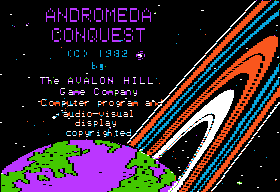
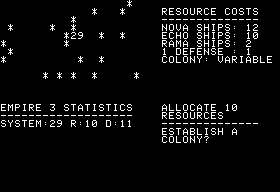
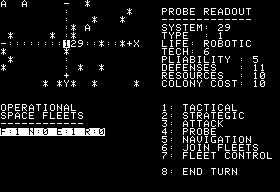



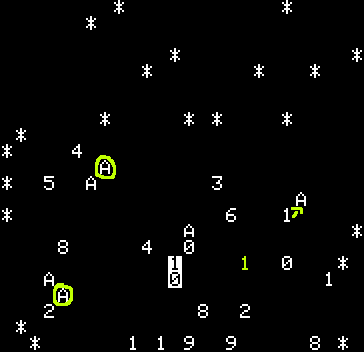

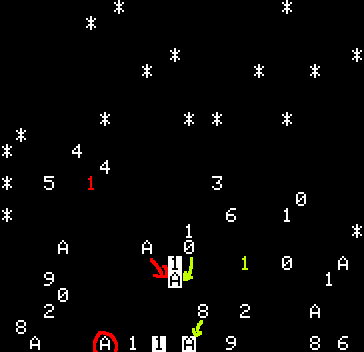


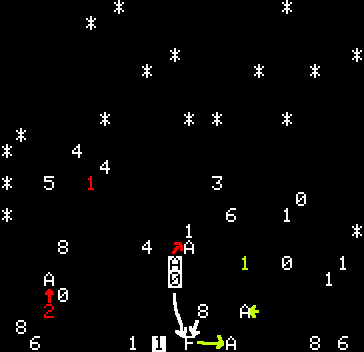

No comments:
Post a Comment
Commenting with signin or name/URL is encouraged but not required. If the spam filter deletes your legitimate comment, apologies - it does that sometimes.